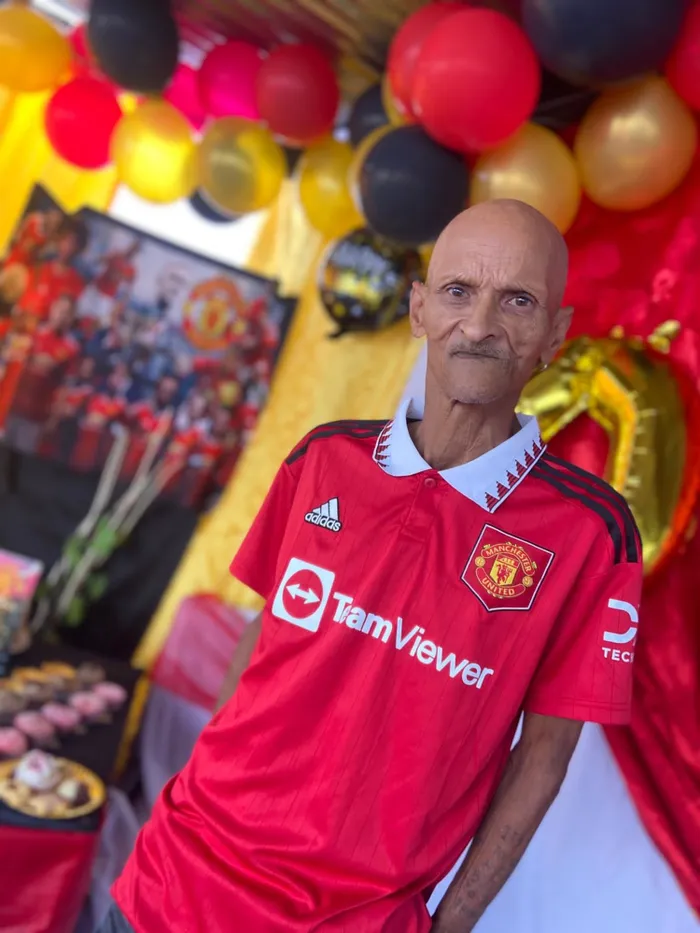Tornado helped gang boss turn his life around

Magadien Wentzel is a former gang leader who changed his life 20 years ago. Here he is pictured at his 60th birthday celebration.
Magadien Wentzel, 60, a once-feared leader of the 28s prison gang, walked away from that life more than 20 years ago, and although his journey to redemption was a hard one, he would not want it any other way, he says.
The Manenberg gangster-turned-community-activist says he never thought he would live to see 60. Most of his fellow gang leaders are either dead or serving long jail sentences.
Mr Wentzel spent 25 years in jail and was the subject of Jonny Steinberg’s award-winning book, The Number, which deals with the numbers gangs.
He was first jailed in 1986 for public violence during the anti-apartheid uprisings. At the time, he was a second-year law student at UWC.
While in jail, he made the wrong choices because of his “hatred for white people”, he says. This led to him becoming involved with the prison gangs. His convictions included assault to cause grievous bodily harm, credit card fraud, and drug smuggling. He was found not guilty on two murder charges.
Then, in 1999, he found himself reaping the whirlwind in a very literal sense when a tornado hit parts of Manenberg. That’s the moment, he says, that he decided to turn his back on a life of crime for good.
“I was worried about my family. I heard about the destruction the tornado caused in Manenberg, and I couldn’t protect them because I was locked in jail. At that time, my thoughts were more about protecting my family, than it was about my healing,” he says.
He was eventually released from prison on June 9, 2003.
Speaking about reaching his “20-year crime-free milestone”, he says, “In today’s life, with all the gang violence and children dying, 20 years is like a lifetime. It was the best move I have ever made. I have no regrets.
“In these 20 years, I have learnt to achieve inner peace, self-respect and self-love. The journey was not easy though. My own family doubted me, and my one sister told me I will only last three months of being crime-free. I won’t lie - it was tough in the beginning. I was tempted to go to the gang to ask for help, as I had no money, no food and couldn’t pay rent.
“There was a time I ended up living on the streets. I considered going back to the gang, but I am happy that I did not. I still struggle today financially, but what I lack in material stuff, I have won back my pride and my joy. The change was quite hard, but so worth it. If you want to change to get away from criminal activity, don’t think your life will automatically become better.”
Rebuilding his life and working on regaining the trust of his family and community was like being a baby all over again, he says.
“You have to learn to walk, then you fall, but you must get back up again.”
Another turning point was when he fell ill with pneumonia in 2009. He says he was on the verge of dying but was determined to stay alive because he wanted to see the 2010 World Cup.
Ironically, he adds, he had a ticket to the opening match but was too sick to go.
He still struggles with upper respiratory problems, but takes things a day at a time, he says.
Over the years, he has worked for various organisations, was a motivational speaker and still regularly talks with young people about making the right choices. He also runs an informal fatherhood project in the community, sharing his knowledge and experience to help men become better fathers.
He says that after spending 25 years in prison he feels like he needs to get involved in efforts to uplift his community to make the change in his life complete.
Mr Wentzel helped to set up the Peace Ambassadors in Hanover Park, and he dreams of winning the fight against gangsterism one day. Peace Ambassadors is an initiative of Professor Brian Williams, who set up this project in various Cape Flats communities to promote peace in gang-ridden areas by helping young people tell their stories.
Among the first people who helped him turn his life around, he says, was Joanna Flanders Thomas, who worked for the Centre for Conflict Resolution. She presented a workshop called “Change begins with me” while he was still in prison. Her then colleague, the late Stan Henkeman, is also among those who helped him.
“They made me believe change is possible. Today I am proof of that, and I want to thank all my warriors and angels who helped me for their support and belief in me, and for always encouraging me about the light at the end of the tunnel. I can see the light now, even though I am only halfway through the tunnel.”